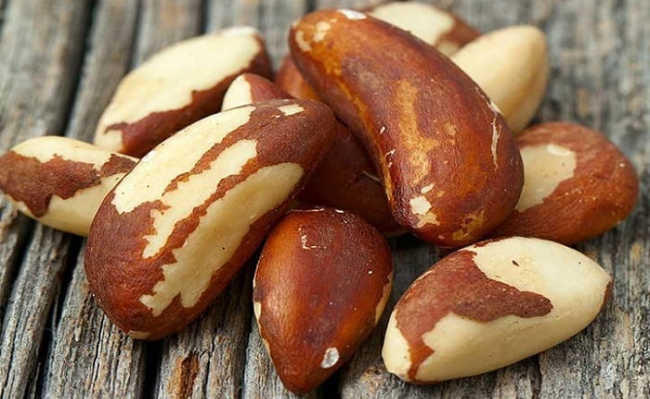Brazil nuts: trivia and benefits
Despite being present in nine Amazon countries and being full of benefits, Brazil nuts are on the list of endangered species

The Brazil nut is the seed of the plant with the scientific name Bertholletia excelsa. Also popularly called Brazil nut, Amazon nut, acre nut, Amazon nut, Bolivian nut, tocari, and tururi; Brazil nuts are native to the Amazon. It has a number of health benefits, such as good for the heart and mood, but despite being present in all nine Amazon countries (Brazil, Peru, Colombia, Ecuador, Guyana, French Guiana, Bolivia and Venezuela) , is threatened with extinction. Understand and know how to consume it sustainably:
- Amazon forest: what it is and its characteristics

Edited and resized image by Alexandre Martins Pereira, available on Wikimedia Commons
The Brazil nut tree and the risk of extinction
The Brazil nut trees are among the tallest in the Amazon, reaching up to 50 meters in height and five meters in diameter.
However, the bad news is that the World Union for Nature (IUCN) considers Brazil nuts to be an endangered species. In Brazil, it is on the Ministry of the Environment's list of threatened species, the main cause being deforestation for the construction of roads and dams; settlements and cattle raising.
- What is deforestation?
What increases the vulnerability of the chestnut tree is that it depends on an untouched environment to reproduce, requiring the presence of insects that are attracted by orchids that grow close to the chestnut trees.
Furthermore, each nut takes from a year to a year and a half to germinate; and its fruit more than a year to ripen.
Therefore, whenever you go to get Brazil nuts, look for the certified one. And try not to indirectly encourage deforestation, avoiding eating meat, for example. Understand why in the article: "Deforestation in the Amazon: causes and how to fight it".
The extraction of Brazil nuts in the mold of traditional indigenous agriculture is a form of sustainable use and contributes to the preservation of Brazil nut trees. Therefore, contrary to what some people might think, consuming certified Brazil nuts and supporting the indigenous struggle helps to keep the Amazon forest standing and, consequently, the Brazil nut trees too.
Brazil nuts benefits
It is rich in selenium
Brazil nuts are very rich in selenium. Each 28 grams of seeds contains 774% of the recommended daily intake (RDI) of selenium. Selenium is a mineral that is extremely vital for the body, as it has strong antioxidant power, fights free radicals and reduces inflammation, which is good for overall health. Studies show that nearly 1 billion people around the world suffer from selenium deficiency, which makes Brazil nuts an excellent food choice (see study about it here).
good for the heart
According to one study, consumption of nuts helps reduce "bad" cholesterol by more than 25%. Brazil nuts have a surprisingly high content of healthy unsaturated fats, commonly known as HDL omega 3 fatty acids. This includes oleic acid and palmitoleic acid. These varieties of unsaturated fats, magnesium, vitamin E and selenium contained in Brazil nuts are related to balancing the cholesterol profile and improving heart health (see study about it here).
It has anti-inflammatory action
The high levels of ellagic acid and selenium in Brazil nuts make it an excellent anti-inflammatory food. Ellagic acid also has neuroprotective properties. And zinc reduces inflammation and helps eliminate toxins.
Increases Testosterone Levels
Dietary selenium may help improve sperm quality, motility and volume, according to a study published in Journal of Urology. Testosterone levels in men and sperm count are correlated, the higher the testosterone, the higher the sperm count. The L-arginine present in chestnuts is also an effective treatment for erectile dysfunction.
Has antioxidant action
Brazil nut's abundant antioxidants help prevent many chronic diseases. A study conducted at the Department of Oncology Surgery, Roswell Park Cancer Institute, in Buffalo, New York, showed that selenium-activated glutathione is an enzymatic antioxidant that scavenges free radicals in all parts of the body.
improves mood
Low levels of selenium are linked to anxiety, stress and tiredness, according to research cited in the journal Biological Psychiatry. Consumption of nuts increases the metabolism of serotonin, a chemical in the brain that controls mood, appetite and sleep. Thus, regular intake of Brazil nuts, which is rich in selenium, can help alleviate the various problems caused by selenium deficiency, such as depression, mood problems, fatigue, and stress.










